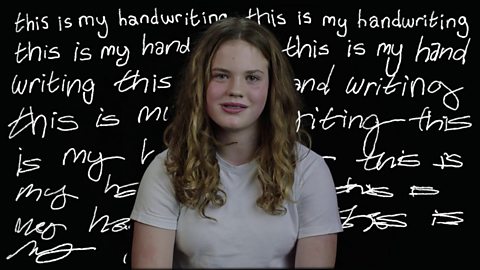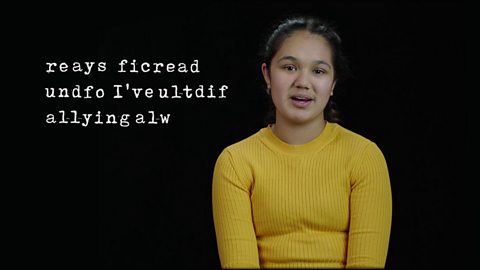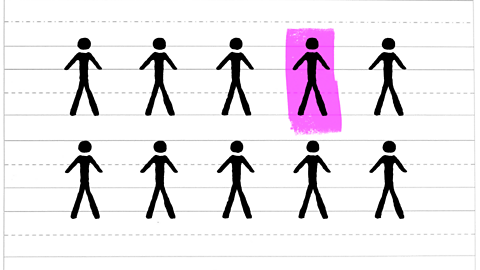Lots of people have dyslexia. In fact, as many as one in 10 schoolchildren have dyslexia.
V/O: We asked pupils with dyslexia to tell us what school and learning is like for them and pull together some top tips and hints which will help them in the classroom.
Maths is the hardest for me. Um, yeah maths is definitely the hardest.
Parts of maths I find easier than other parts I kind of struggle with decimals and fractions.
V/O: One of the early signs of dyslexia is number reversal. Putting displays on walls or numbers in front of children to refer to can help.
Times tables are one of those things that you really need in your life but theyβre still really annoying.
V/O: For dyslexic children who struggle with their memory, times tables can be one of the biggest hurdles.
I struggled to learn my sixes, sevens and my twelves and my threes were hard as well.
V/O: Learning some tricks can help, like using your fingers to work out the nine times table. Take seven times nine.
Two, three, four. Five, six, seven. So, seven times nine is sixty three.
It really helped me with learning my multiplications when teachers used to take us outside and play lots of games, and it definitely motivated pretty much everybody in the school to get a lot better at maths.
V/O: And pupils can always have multiplication grids or even a calculator to hand
The problem with word problems is that I kind of think well, who's Bob or whoβs Geoffrey, orβ¦youβre kind of going off the topic.
As I'll just be reading it, I'll be struggling to actually understand what's going on, and then it's like, oh, I have to find maths in this. It's just more confusing when there are words put into it.
V/O:Word-based maths problems may present difficulties, so learning to scan and highlight for key information is a skill worth practicing.
If it's just two plus four, that's easier toβ¦. understand and work out
V/O: You could give pupils a prompt card listing maths functions and the language associated with them to refer to.
Now, I just read over it a lot of times and then I also highlight key words so I understand it more, and that helped me learn how to do like word problems.
V/O:Not all children with dyslexia will find maths hard, but like lots of children, they may struggle to tell the time.
I found telling the time really difficult because of the half pasts like and the quarter pasts, so I got really confused.
V/O: It might be easiest to start with a digital clock which will be familiar to them before moving on to analogue time. Point out that the hour hand is short like the word hour and the minute hand is longer like the word minute and label clock faces with one half PAST and the other TO.
Digital clocks I'm okay with. But not but not 24 hour because when it goes past 12 o clock and goes into 13 and stuffβ¦I donβt like that.
V/O:Many children with dyslexia can visualise mathematical problems.
I can feel their surroundings and feel more 3-D images than most people can.
I find like angles and shapes and like area and stuff easier. I think it's just because it's not as mathsy.
V/O: Make abstract concepts more concrete using number lines or physical props and make maths fun. Lots of these pupils are really good problem solvers.
Children with dyslexia describe their difficulties with maths. The film offers tips and advice to help.
They talk about number reversal, times tables, word problems, multiplication and their ability to visualise problems. The film offers practical suggestions on how best to support them.
Maths is seen as the hardest subject for pupils with dyslexia - in fact one of the early signs of dyslexia is number reversal.
Putting displays on walls or numbers in front of children to refer to can help.
For dyslexic children who struggle with their memory, times tables can be one of the biggest hurdles. There are some tricks that can help, like using your fingers to work out the times table.
This helped Alfie, who says: "It really helped me with learning my multiplications when teachers used to take us outside and play lots of games, and it definitely motivated pretty much everybody in the school to get a lot better at maths."
Not all children with dyslexia will find maths hard, but like lots of children, they may struggle to tell the time.
"Digital clocks I'm okay with. But not 24 hour because when it goes past 12 o'clock and goes into 13 and stuffβ¦ I donβt like that," says Fin.
Many children with dyslexia can visualise mathematical problems. Trying to make abstract concepts more concrete by using number lines or physical props can make maths fun for all students.

More from this series
Writing. video
Children with dyslexia describe their difficulties with writing. The film offers ways to help with different difficulties.

Reading. video
Children with dyslexia explain what reading is like for them, and the film gives tips and hints on how you might support them in school.

The classroom. video
Children with dyslexia describe their difficulties with classroom learning. The film offers a range of practical strategies to help.

Pupil perspective. video
Children with dyslexia describe how it affects their lives at school, and give their own perspective on what helps them.
